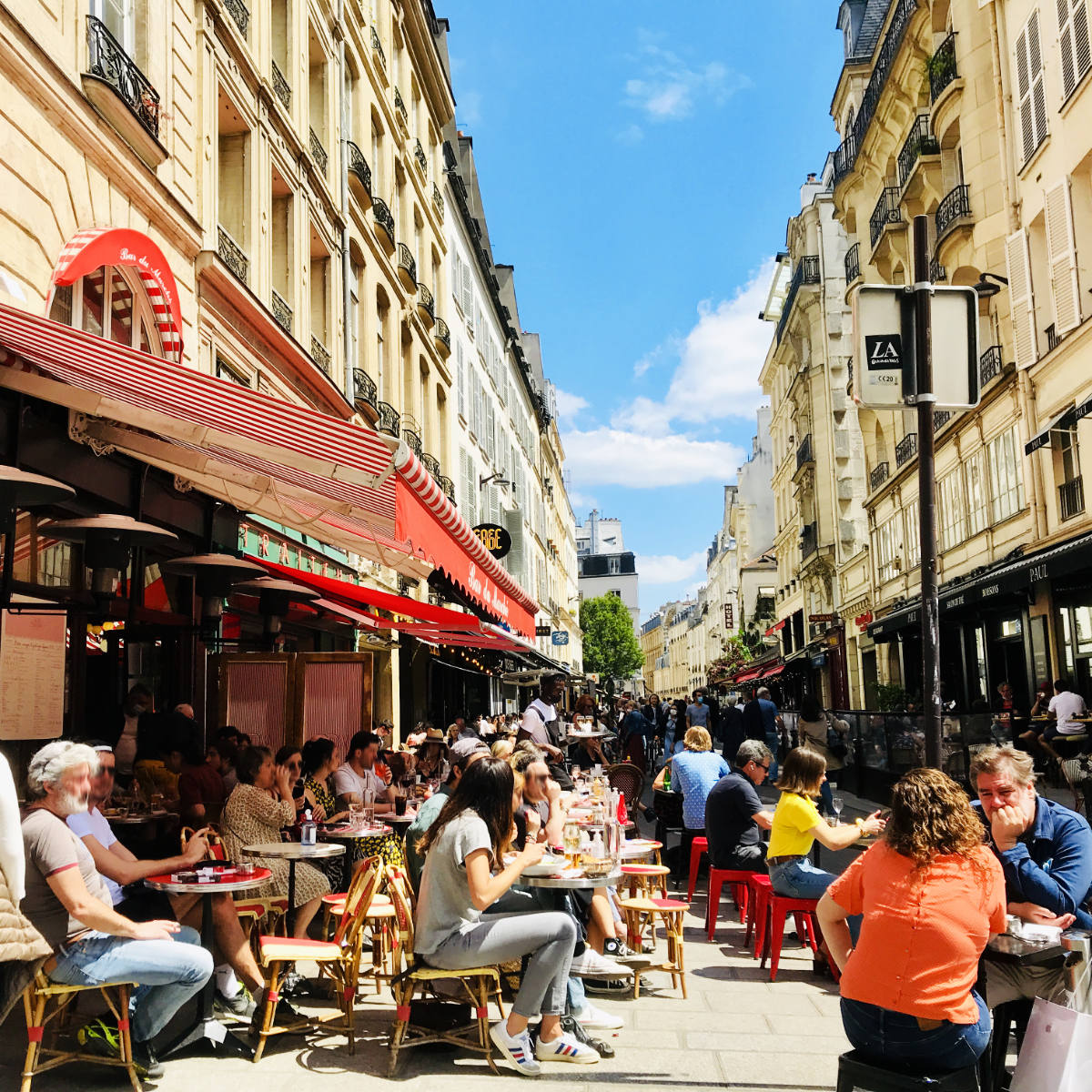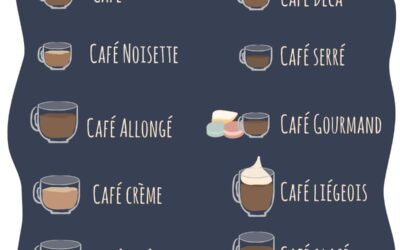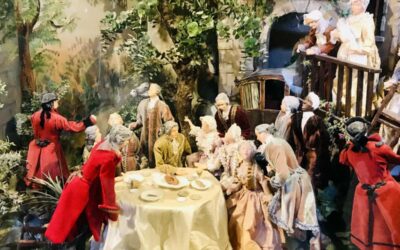French is a romantic language with a well-deserved reputation for being sensual and passionate. But that doesn’t mean that it can’t get down and dirty, with a bit of slang and some colloquialisms thrown in.
argot – slang
French – English translation
There’s no doubt about it, picking up a few French slang words and phrases can seriously up your language game. Tossing these words into your everyday chats not only makes you sound more laid-back but also gives you a real feel for the French language. It’s like unlocking a whole new level of fluency!
Whether you’re traveling to France for fun, business, or pleasure, knowing a few nicknames and French expressions can help you get by with the locals. So let’s get to the most common French slang words and expressions, shall we? Allons-y!
- SMS Text and Conversational Slang
- 1. Slt – Hello
- 2. Stp – Please
- 3. Svp – Please
- 4. Bjr – Hello
- 5. Bsr – Goodbye
- 6. A+ – Later
- 7. Rdv – Meeting, appointment
- 8. Ton 06 – Your mobile phone number
- 9. K29 – What's new?
- 10. Mdr – Lol
- 11. QQ – Someone
- 12. Auj – Today
- 13. Un mail – email
- 14. Pq? – why?
- 15. Wétu? – where are you?
- 16. Je t’m – I love you
- 17. Aprem – afternoon
- 18. Toutafé – Completely
- 19. Dsl – Sorry
- 20. Tjs – Always
- 21. Jms – Never
- 22. Dak – Okay
- 23. A2M1 – See you tomorrow
- 24. Bcp – a lot
- 25. Vs/Ns – You/Us
- 26. Biz – Kisses
- For People
- 1. Un mec – a guy
- 2. Un gars – a guy (friendly)
- 3. Un type – a guy (who is potentially strange)
- 4. Une nana – a (young) woman
- 5. Une gonzesse – Chick
- 6. Un frangin(e) – Brother/sister
- 7. Beaufs – Boor
- 8. Ploucs – Country bumpkins
- 9. Un(e) gamin(e) – a child
- 10. Un(e) môme – a small child
- 11. Un(e) gosse – a child
- 12. Un beau gosse – a handsome/hot guy
- 13. Un flic – a police officer
- 14. Un(e) pote – a friend
- 15. N + 1 – Manager
- 16. Le boss – the boss
- 17. Parigo – Parisian
- For Objects
- 1. Un truc – a thing
- 2. Un machin – a thing
- 3. Un bidule – a thing
- 4. Les fringues – clothes
- 5. Les pompes – shoes
- 6. Le frigo – the fridge
- 7. La bouffe – food
- 8. Le fric – money
- 9. Le pognon – money
- 10. La thune, tune – cash, money
- 11. Beaucoup de blé – lot of money
- 12. Une caisse – a car
- 13. Une bagnole – a car
- 14. Une bécane – a moto
- 15. Un coup de fil – a phone call
- 16. Une clope – a cigarette
- 17. Un bouquin – a book
- 18. Une arnaque – a scam
- 19. Un flingue – gun
- Verlan (backwards slang)
- French Children's slang
- For Places
- Compliments and Cool Expressions
- Verbs
- 1. Bouffer – to eat
- 2. Bosser – to work
- 3. Picoler – to drink alcohol
- 4. Bourré(e) – drunk
- 5. Torché(e) – drunk
- 6. Draguer – to flirt
- 7. Piquer – to steal
- 8. Déboussolé – disorientated
- 9. Gerber – to vomit
- 10. Baraqué(e) – muscular
- 11. Défoncé – broken, destroyed
- 12. Mal barré(e) – in trouble
- 13. Cinglé(e) – insane, crazy
- 14. Dingue – crazy, outrageous
- 15. Déjanté(e) – crazy
- 16. Crevé – exhausted
- 17. Se planter – to make a mistake
- 18. Balancer – to give up, to out, to reveal
- Other Slang Phrases
- 1. T’inquiète – Don't worry
- 2. Elle est canon – She's hot
- 3. Costaud – large/muscular
- 4. Flasher sur quelqu’un – to have a crush on someone
- 5. Boire un coup – to have a drink
- 6. C'est bof – That's terrible
- 7. C’est nul – That sucks
- 8. Ça craint – That is worrisome
- 9. Ça déchire – Tears up a storm
- 10. Ça marche – That works
- 11. Ça me saoule – That annoys me
- 12. Ça me gonfle – that pisses me off
- 13. C’est clair! – That's true!
- 14. C'est naze – That sucks
- 15. C’est un truc de ouf! – That’s totally crazy
- 16. Dégueulasse – Disgusting
- 17. Il a pété un cable – He freaked out
- 18. Être au taquet – To be on top form
- 19. Ferme ta gueule! – Shut your mouth!
- 20. À la bourre – running late
SMS Text and Conversational Slang
Like in English, French people like to get creative when typing an sms or an email. Here are the most common written and conversational slang abbreviations you will find in France:
1. Slt – Hello
Slt is short for salut, which is a casual way of saying Hello in French.
2. Stp – Please
The casual stp, meaning s’il te plaît, often comes in handy if you are asking for something, but only if the other person understands what you are asking for!
3. Svp – Please
A more formal svp, meaning s’il vous plaît, will often be seen in work emails or other email correspondence, although you should avoid it in letters, etc.
4. Bjr – Hello
There are so many different ways to say hello in French, and here is another one. Bjr which is short for “bonjour“, meaning “hello”.
5. Bsr – Goodbye
And for goodbyes in French, there is bsr which is short for “bonsoir“, meaning “goodbye”.
6. A+ – Later
A conversation ending A+ is not a grade in school, but rather an à plus meaning “goodbye” or “see you later” in French.
7. Rdv – Meeting, appointment
Rdv comes from the French word rendez-vous, meaning meeting or appointment.
Eg. J’ai un rdv à 13h, meaning “I have a meeting at 1pm”.
8. Ton 06 – Your mobile phone number
Phone numbers in France start with 06, so if someone says “C’est quoi ton 06?” meaning “What is your 06?”, it means they are asking for your phone number. And yes, it is a pick-up line, so if you are looking to meet that special someone, this may be your chance 😉
☞ READ MORE: French travel phrases you need for a trip to France
9. K29 – What’s new?
K29 is a bit hard to decipher, but it actually stands for “Quoi de(ux) neuf?“, meaning “what is new?” or “what’s up?”.
10. Mdr – Lol
The French version of “Lol” or “Laugh out loud” is “Mort de rire” or “Mdr“. It translates to “dying laughing” in English.
11. QQ – Someone
QQ as in “quelqu’un” or “somebody”.
12. Auj – Today
Auj is one that is relatively easy to guess, “aujourd’hui“, meaning “today”.
13. Un mail – email
Mail in French is rather confusing because it actually is slang for un email, not postal mail. In addition, un email is also slang as the correct word in French is un courriel.
14. Pq? – why?
Pq is short for pourquoi, meaning why in French.
15. Wétu? – where are you?
Wétu doesn’t seem like a very obvious word, but it is short for où es-tu, meaning “where are you?”
16. Je t’m – I love you
Another abbreviation that can leave you scratching your head is Je t’m or Jtm, which is short for je t’aime, meaning “I love you”.
Interestingly, the English xxx signature sign-off is not common in France, even though this is the land of the bises (kisses).
17. Aprem – afternoon
Aprem is short for après-midi, meaning “afternoon”.
18. Toutafé – Completely
Toutafé is short for “tout à fait“, meaning “completely” or “totally agree”.
19. Dsl – Sorry
Dsl doesn’t refer to a camera in this instance, but rather “désolé” or “sorry”.
20. Tjs – Always
Tjs stands for “toujours” as in “always”.
21. Jms – Never
Jms is short for “jamais” as in “never”.
22. Dak – Okay
Dak is short for “d’accord“, meaning “okay” or “alright”.
23. A2M1 – See you tomorrow
A2M1 is not a typo, but stands for “à demain“. Not all that obvious, but it is what the kids are using these days to say “see you tomorrow”.
24. Bcp – a lot
Bcp meaning “beaucoup” as in “a lot”. So you might see something like “je t’m bcp“, meaning “l love you a lot”.
25. Vs/Ns – You/Us
Vs is short for “vous” and Ns is short for “nous”. For those times when one is too lazy to write out the whole word.
26. Biz – Kisses
Biz is short for “bisous” meaning “kisses”. There are rules in France to how many cheek kisses to perform and when, so just because you are texting someone, doesn’t mean you don’t end with a little biz.
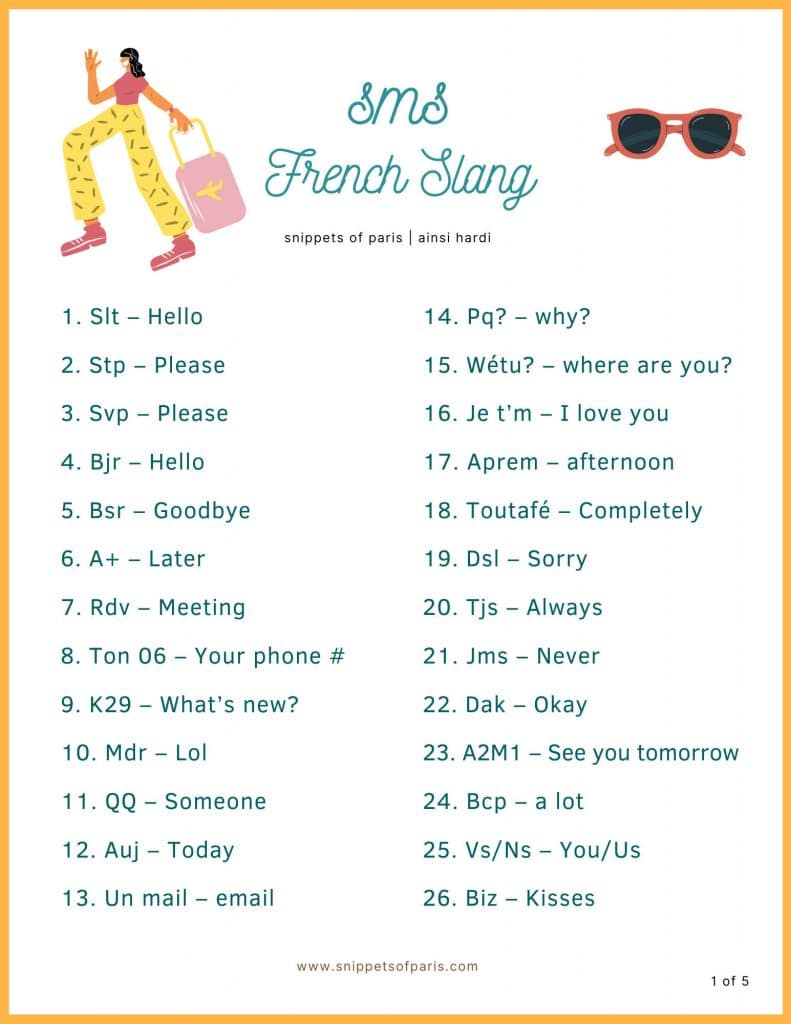
For People
1. Un mec – a guy
A mec is one of those ubiquitous French slang words that is used all the time.
Eg. Il y a un mec qui va arriver aujourd’hui à 17h, meaning “there is a guy who is coming today at 5pm”.
2. Un gars – a guy (friendly)
Gars also means a guy, but in a tone that is more friendly. Eg. salut les gars, meaning “hi guys!
3. Un type – a guy (who is potentially strange)
Un type, on the other hand, is a bit less friendly. Eg. un sale type, meaning “a dirty/sketchy guy”.
4. Une nana – a (young) woman
Nana usually refers to woman and is casual, without being rude.
Eg. C’est une nana vraiment sympa, tu vas l’adorer, meaning “she’s a great girl, you will love her.”
5. Une gonzesse – Chick
Not the most polite in terms of slang is gonzesse which always makes me think of a well-endowed bosom. Appropriate then that it would approximately translate to “chick”.
6. Un frangin(e) – Brother/sister
Frangin or frangine is an affectionate way to say sibling in French. Eg. Je vais aller au cinéma avec ma frangine, meaning “I’m going to the cinema with my sister.”
7. Beaufs – Boor
Beauf can have a couple of meanings here, with the kinder version being “brother-in-law”. A less flattering meaning when referring to non-family members would be a “boor” or “vulgar person”.
8. Ploucs – Country bumpkins
An insult that is not in doubt is the plouc, which means a country bumpkin.
Eg. There was a film called Fantasia chez les ploucs. You can read more French insults here.
9. Un(e) gamin(e) – a child
There are several slang words for child in French, which can mostly be used interchangeably.
Eg. Tu as vu le gamin? Il est très fort au foot, meaning “have you seen the kid? He is very good at football”.
10. Un(e) môme – a small child
A môme is a small child, possibly even a baby. It is not used for teenagers. Eg. Il a un môme maintenant? meaning “he has a child now”?
11. Un(e) gosse – a child
In comparison, a gosse is likely slightly older, but still can be quite young. Eg. Il a deux gosses maintenant, meaning “he has two kids now”.
12. Un beau gosse – a handsome/hot guy
A beau gosse has nothing to do with children, and everything to do with that hot guy you spot at the gym bench-pressing weights.
13. Un flic – a police officer
There are several slang words for the police just as in English, but the most common one is flic.
Eg. Vite, les flics arrivent!, meaning “quick, the police are coming!”
14. Un(e) pote – a friend
Pote is a very common slang word for friend. Slightly less common are poteau or poto, but they are also used in the regular French vernacular.
15. N + 1 – Manager
In French workplaces, people will often refer to their manager as N+1 and is 1 level above you. But this can go higher as well, from N+1 (meaning direct manager) on up, eg. N+2, N+3, N+4, etc.
eg. “J’ai un rdv avec mon N+2“, meaning “I have a meeting with my senior manager”.
16. Le boss – the boss
Often, simply using the english word can be a form of French slang as well. The French word for “boss” is patron or chef, so using boss is actually an anglicism.
17. Parigo – Parisian
Parisians sometimes refer to themselves as Parigos. Eg. Oi, parigo!
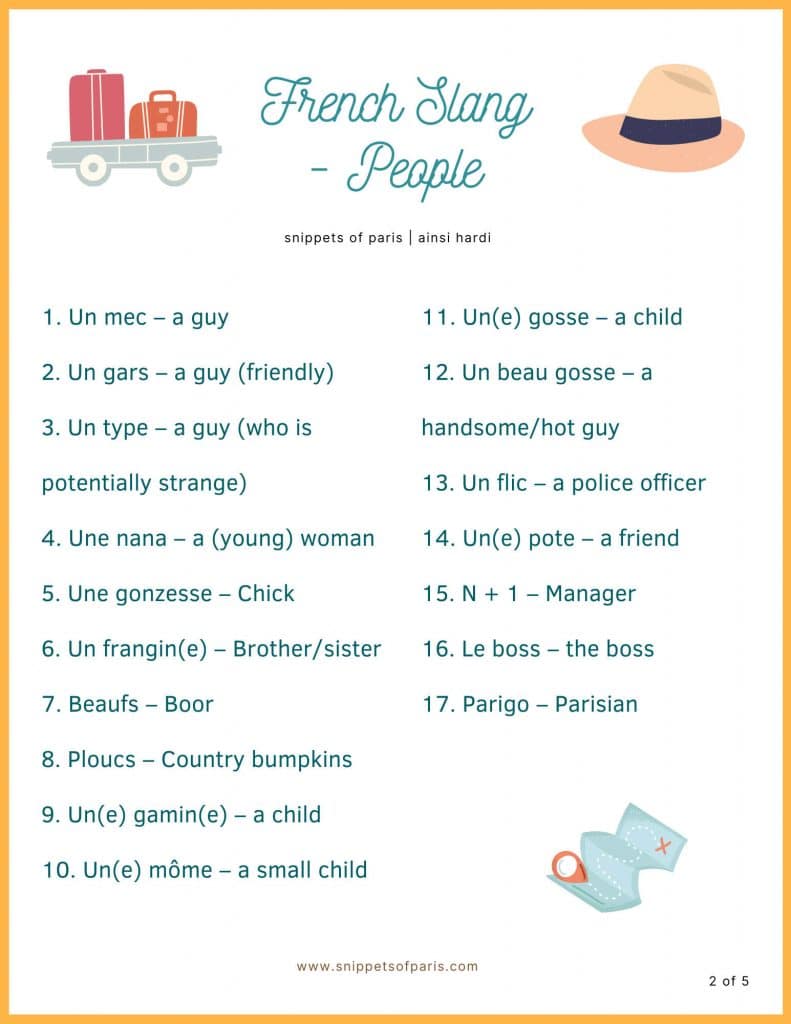
For Objects
1. Un truc – a thing
Un truc means a “thing”, but it can also be used in other nebulous situations, the same as in English.
Eg. Je ne peux pas venir, j’ai un truc ce samedi, meaning “I can’t come, I have a thing this saturday.”
2. Un machin – a thing
Machin is usually only used in relation to a physical object, unlike truc. Eg. C’est quoi ce machin? meaning “What is this thing?”
3. Un bidule – a thing
Less common than machin is bidule. Eg. Il a inventé un bidule que personne comprend, meaning “he invented something that no one understands.”
4. Les fringues – clothes
Les fringues refers to clothes, but usually only for women.
Eg. J’ai besoin d’acheter les fringues ce weekend, meaning “I need to buy some clothes this weekend.”
5. Les pompes – shoes
Les pompes refers to shoes, but usually just for women as well. It doesn’t necessairily mean “pumps” which in French would be talons meaning “heels”.
6. Le frigo – the fridge
Frigo is short for refrigerator in French, aka the “fridge”.
7. La bouffe – food
Eg: Ne penser qu’à la bouffe, meaning “don’t just thing about the food”.
8. Le fric – money
There are several ways to say money, which are all pretty interchangable.
Eg. Je reviens samedi avec le fric, meaning “I’ll come back on Saturday with the money”.
9. Le pognon – money
Eg. Et Chip et Dale raflent le pognon, meaning “Chip and Dale disappeared with the cash”.
10. La thune, tune – cash, money
As the song goes “Tout le monde veut seulement la thune“, meaning “everybody just wants money”.
11. Beaucoup de blé – lot of money
Blé means wheat, but in this case it means “money”. Eg. Cette maison m’a coûté beaucoup de blé!, meaning “this house cost me a lot of money.”
12. Une caisse – a car
Caisse has several meanings. It could also be the cashier in a shop or a café, or it could be a fund, as in Caisse d’Epargne which is a bank in France.
But as slang, it means a car. Eg. Tu vas ramener ta caisse?, meaning “You are going to bring your car?”
13. Une bagnole – a car
The word bagnole is much more straight-forward. Eg. Je suis content de ma bagnole, meaning “I’m happy with my car.”
14. Une bécane – a moto
A becane could be a machine like a computer, but it could also be a moto. Eg. Il va au lycée en bécane, meaning “he goes to high school on his moto.”
15. Un coup de fil – a phone call
Eg. Passe-moi un coup de fil dimanche, meaning “give me a call sunday”.
16. Une clope – a cigarette
Eg. Tu as une clope stp?, meaning “Do you have a cigarette, please?”
17. Un bouquin – a book
Eg. Je peux emprunter ce bouquin, svp? meaning “Can I borrow this book, please?”
18. Une arnaque – a scam
Eg. En se faisant pirater ses données, elle a été victime d’une arnaque sur Internet, meaning “In having her info stolen, she was a victim of a scam on the web.”
19. Un flingue – gun
Eg. Il a décidé de prendre des cours pour maîtriser le flingue, meaning “he decided to take a class to master firing a gun”.
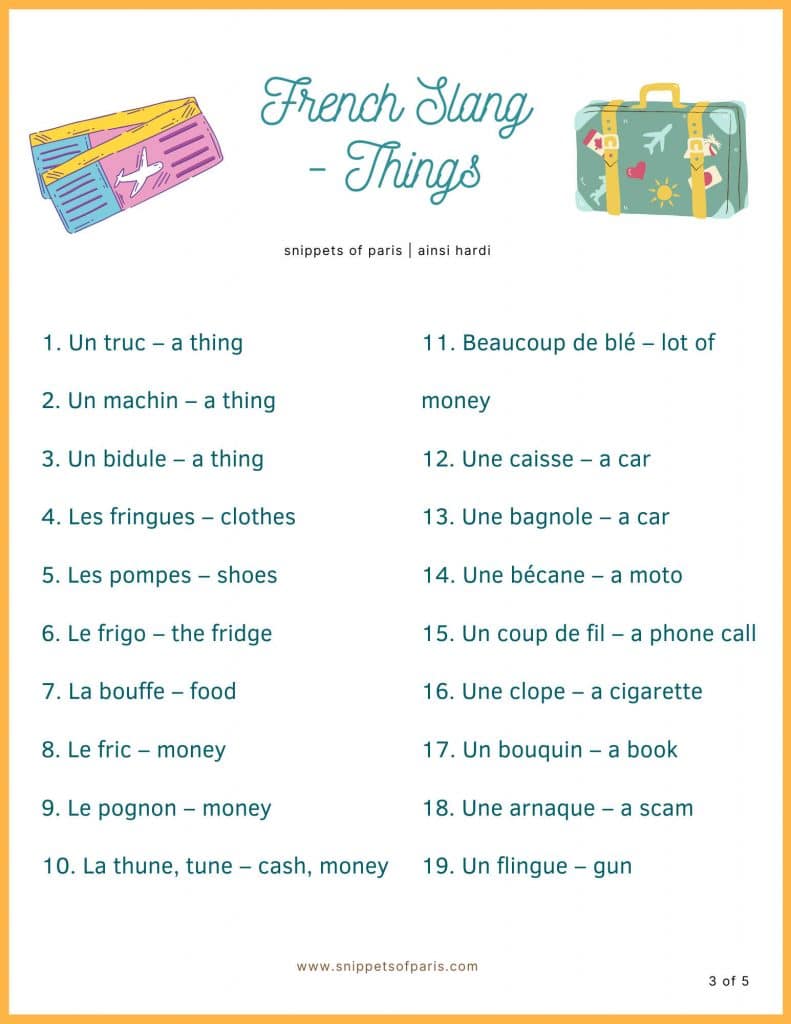
Verlan (backwards slang)
Another type of French slang, is a particular subset called Verlan, which involves reversing the letters of the alphabet.
Verlan – a type of French slang
French – English translation
Now, it is not just any word that can be reversed, there are only particular words that are reversed, and in a particular order.
Some of the most common verlan that have become popular even among people over 30 are:
1. Une meuf – Woman
Meuf stems from the word “une femme” meaning “a woman”, but can also mean “girlfriend”.
Eg. Tu sais s’il a une meuf? meaning, “do you know if he has a girlfriend?”
2. La teuf – Party
Teuf comes from the French word “la fête“, meaning to celebrate or to have a party.
Eg. “Faire la teuf“, meaning “faire la fête”, to have a party.
3. Zarbi – Strange
Zarbi comes from the French word “bizarre“, meaning strange.
Eg. il était vraiment zarbi, meaning “he is really strange”.
4. Jourbon – Hey
Jourbon comes the French bonjour, and is another way of saying hello. You can read more about the rules of saying hello in French here.
5. Chelou – Shady
Chelou is verlan for the French word “louche“, meaning shady.
Eg. C’est un peu chelou, meaning “its a bit weird or a bit shady”.
French Children’s slang
There are certain French slang words that are only used in the context of children, which are as follows:
1. Le dodo – sleep
Eg. Il faut faire dodo les enfants!, meaning “it is time to sleep kids!”
There are also several French lullabies which use the word dodo that you can read here.
2. Mon doudou – my favorite toy
Eg. Je ne trouve pas mon doudou!, meaning “I can’t find my favorite toy!”
Doudou is probably the 1st word of most French kids, and is similar to other words that sould similar like nounou (nanny), loulou (my loved one) etc. You can read more funny things kids say here.
3. Le bahut – school
eg. C’est où ton bahut?, meaning “where is your school?” It usually refers to middle school (collège) or high school (lycée), not primary schools.
For Places
In French, Certain places also sometimes have slang words attached to them, just like in English. Some examples are:
1. Une baraque – maison
Eg. Tu as une belle baraque!, meaning “you have a gorgeous house!”
2. Le boulot – the job/office
Eg. Je suis à la bourre, je devrais déjà être au boulot, meaning “I am running late, I was supposed to be at work.”
3. Le taf – the job/office
Eg. T’es où? Je suis au taf, meaning “Where are you? I’m at work.”
4. Une boîte – the company
Eg. Tu travailles pour quelle boite?, meaning “you work for which company?”
5. La taule – prison
Eg. Quoi? Il est en la taule!?, meaning “What? He is in jail!?”
6. Paname – Paris
Paris has many nicknames, among them Parigi, which is Italian for Paris, as well as Paname.
The name Paname is believed to have come from a borsalino type hat of Ecuadorian origin, which workers used to wear while building the Panama Canal in South America. It was shown at the Universal Exhibition of 1855 and Parisians found cool and immediately started wearing around town. Close to 200 years later, and the name has still stuck. You can find more interesting facts about Paris here.
Compliments and Cool Expressions
There are several ways to say “that’s cool” in French or express your delight. Most of these examples are interchangeable:
1. Formidable! – That’s cool!
For a simple way to say “that’s cool”, you can say “formidable!”.
eg. “c’est formidable ce que tu as fait!” – that’s so cool what you have done” or “that’s excellent!”
2. Chouette! – awesome!
The word “chouette” means owl, but in this case it is also slang for “awesome”, “cute” or “sweet”!
Eg. Ah, il est trop chouette, meaning “he is too cute”.
3. Nickel! – Perfect!
Nickel is one that you will hear a lot, even amongst older French people. Meaning “perfect” or “fabulous”, it works on any occasion.
4. C’est top! – That’s great!
C’est top is just a more slangy way to say “C’est super!”, or “that’s great!”.
5. Je kiffe! – I love it!
Kiffe is the French verb Kiffer and means to like or to fancy something. It can also mean to appreciate something. Eg. je kiffe ta veste, meaning “I love your jacket”.
In some instances, you can also say “je te kiffe” as in “I like you”, but this can go quite wrong if you say it to a stranger, so should be limited to friends.
6. Impec! – Perfect!
Impec is slang for the French world impecable, and has the same meaning as “perfect”, “great”, or “fabulous”.
☞ READ MORE: Famous French quotes about travel
Verbs
If you know your conjugation rules, these French slang verbs will be a breeze to use:
1. Bouffer – to eat
Eg. Tu bouffe à la canteen, ce midi? meaning “Are you eating in the canteen this afternoon?”
In addition, as I mentioned earlier, the noun la bouffe means “food”.
2. Bosser – to work
Eg. Il bosse chez Apple, meaning “he is working for Apple”.
3. Picoler – to drink alcohol
Eg. Il picole chaque après-midi, meaning “he drinks every afternoon.”
4. Bourré(e) – drunk
Eg. J’étais complètement bourré après le concert hier, meaning “I was completely drunk after the concert yesterday.”
Note, this is different from à la bourré discussed earlier, which means “to be late”.
5. Torché(e) – drunk
Eg. Il est complètement torché, ce mec! meaning “he is completely drunk, this guy!”
6. Draguer – to flirt
Eg. Il essaie de draguer chaque fille qu’il rencontre, meaning “he tries to pick up every girl he meets”.
7. Piquer – to steal
Eg. Attention, je pense ce mec essaie de piquer ton portefeuille, meaning “Attention, I think that guy is trying to pick you wallet.”
8. Déboussolé – disorientated
Eg. J’étais déboussolé quand je suis arrivé à New York, meaning “I was disoriented when I arrived in New York”.
9. Gerber – to vomit
Eg. Il a trop bu et a gerbé dans les toilettes, meaning “he drank too much, and threw up in the toilet”.
10. Baraqué(e) – muscular
Eg. Il est bien baraqué grand et fort, meaning “he is quite big and strong”.
11. Défoncé – broken, destroyed
Eg. Il m’a défoncé à tennis, meaning “he destroyed me at tennis”.
12. Mal barré(e) – in trouble
Eg. J’étais mal barré quand ma voiture n’a pas commencé ce matin, meaning “I was in trouble, when my car didn’t start this morning.”
13. Cinglé(e) – insane, crazy
Eg. Il est cinglé, ce mec! meaning “he is insane, this guy!”
14. Dingue – crazy, outrageous
Eg. C’est tellement compliqué, c’est dingue!, meaning “it is so complicated, it’s crazy!”
15. Déjanté(e) – crazy
Eg. Elle est déjantée!, meaning “she is crazy!”
16. Crevé – exhausted
Eg. Je suis crevé, meaning “I’m exhausted”.
17. Se planter – to make a mistake
Eg. Il s’est planté devant le juge, meaning “he messed up in front of the judge”.
18. Balancer – to give up, to out, to reveal
Balancer someone refers to revealing a secret, as in to out someone or something that has been kept hidden.
Eg. “balancer ton porc” – the French version of the Me Too movement, meaning “reveal your pig”.
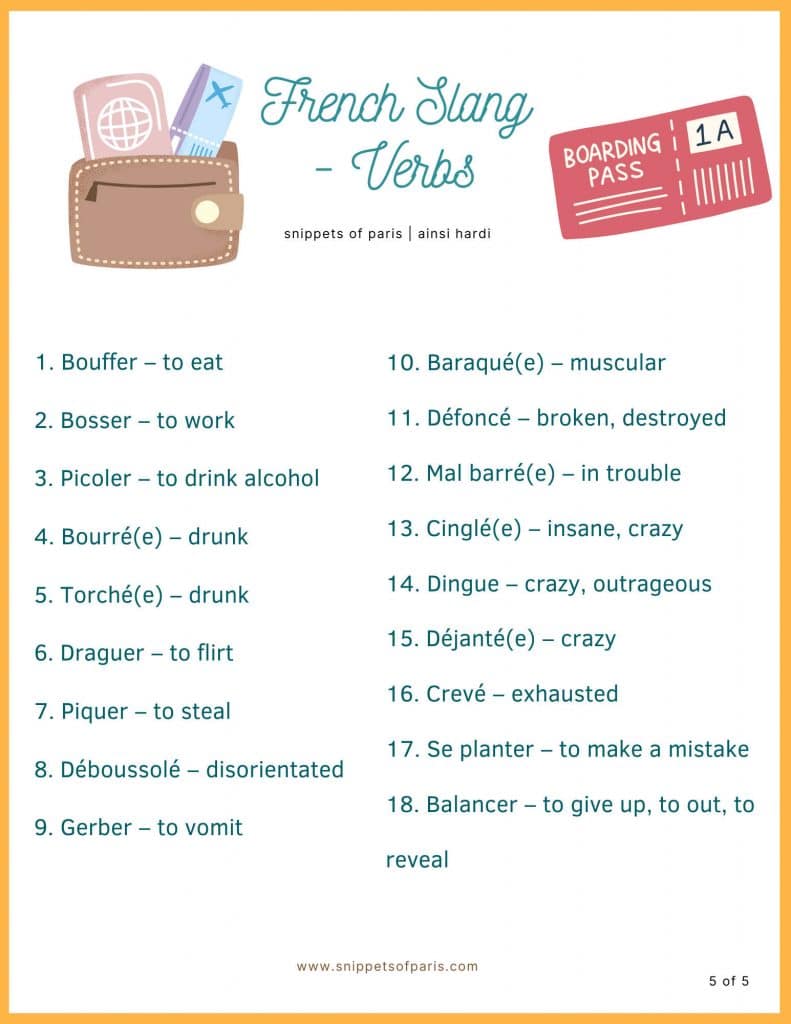
Other Slang Phrases
Several French slang phrases don’t particularly fit into any category, so I’ve put them all together here:
1. T’inquiète – Don’t worry
T’inquiète is short for the instruction “ne t’inquiète pas“, meaning “don’t worry”. (And in case you are wondering, there is no s at the end of inquiète as it is imperitif.)
2. Elle est canon – She’s hot
Canon here breaks all the language rules, without an e at the end, because it refers to canons de beauté. Anyway, either way you spin it, elle est canon.
3. Costaud – large/muscular
Costaud is slang for muscular, almost like “beefy” would be. Eg. Il est très costaud, meaning “He is very large/muscular”.
4. Flasher sur quelqu’un – to have a crush on someone
When you see someone and you fall in love at first sight, tu as flashé sur quelqu’un. In other words, you have been thunderstruck.
(Now, if you have “flashed” on someone and want to make the first move, you can read some French pickup lines here. )
5. Boire un coup – to have a drink
If you want to head out for apéro hour, this French slang expression may come in handy.
Eg. Tu veux boire un coup ce soir? meaning, “do you want to have a drink tonight?”
6. C’est bof – That’s terrible
A bit of French slang here, c’est bof means “that’s terrible” or “that sucks”. You can use it all sorts of occasions, where it is not that rude, but if you do use it in a Michelin 3-starred restaurant to comment about the food, you will insult the chef.
7. C’est nul – That sucks
Another phrase that doesn’t work in a 3-star restaurant is “c’est nul“, which also means “that sucks”.
8. Ça craint – That is worrisome
Ça craint could be anything from “that’s worrisome” to “that’s dodgy”.
Eg. ne va pas faire ton footing le soir, ça craint trop, meaning “don’t go jogging at night, it’s a bit dodgy”.
9. Ça déchire – Tears up a storm
If your favorite band is tearing up a storm, you might say “ça déchire“!
10. Ça marche – That works
Marcher is the verb for “walking”, but ça marche means “that works” or “okay, I agree”.
Eg. Tu peux le finir avant mardi? Oui, ça marche. meaning “Can you finish that before tuesday? Yes, that works.”
11. Ça me saoule – That annoys me
This slang expression literally translates to “that is making me drunk”, but in essence, you are saying that you are really annoyed. The upcoming election: Ça me saoûle.
12. Ça me gonfle – that pisses me off
Gonfler means “to inflate”, so this slang expression literally means “that inflates me”. In practical terms though, it means “it is pissing me off”.
13. C’est clair! – That’s true!
C’est clair literally means “it’s clear”, but actually is meant to signify “I agree” or “that’s true”.
14. C’est naze – That sucks
Bringing it back down would be the teenage-oriented C’est naze, meaning “it sucks”. Having to do homework after school: C’est naze.
15. C’est un truc de ouf! – That’s totally crazy
Un truc means “a thing” and ouf is just a sound, but all together it becomes “that is totally crazy!”
16. Dégueulasse – Disgusting
Dégueulasse is somewhere between slang and a swear word, meaning “disgusting”. For kids in school it a gros mot. You can say “c’est dégueulasse“, or just shorten it to “dégu!” to rhyme with “eww!”
By the French way to say “eww” is actually “berk”.
17. Il a pété un cable – He freaked out
The phrase literally translates to “he farted a cable”, but actually means “he freaked out”.
Eg. “Quand il a vu la facture, il a pété une cable,” meaning “when he saw the bill, he freaked out”. You can read more funny French phases here.
18. Être au taquet – To be on top form
This slang phrase literally translates to “be at a wedge (piece of wood)”, but actually means “to be on top form” or “to give it your best shot”.
Eg. “Tu es prêt pour demain? Il faut être au taquet!” meaning “are you ready for tomorrow? You are going to have to give it your best!”
19. Ferme ta gueule! – Shut your mouth!
This slang curse word can also be used in the short version “Ta gueule“. Guele literally means “your mouth“, so the French idiom “bois de guele“, means hangover (wooden mouth).
In this case however, there is no equivocating, “ferme ta guele” is quite rude.
20. À la bourre – running late
Eg. Je suis à la bourre, je devrais déjà être à l’école, meaning “I am running late, I was supposed to be at school.”


You can download a pdf version of the French slang printables below. And if you enjoyed that article, you may enjoy reading more articles about the French language here. A bientôt!
